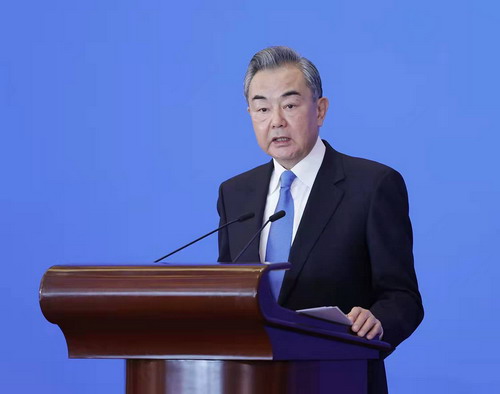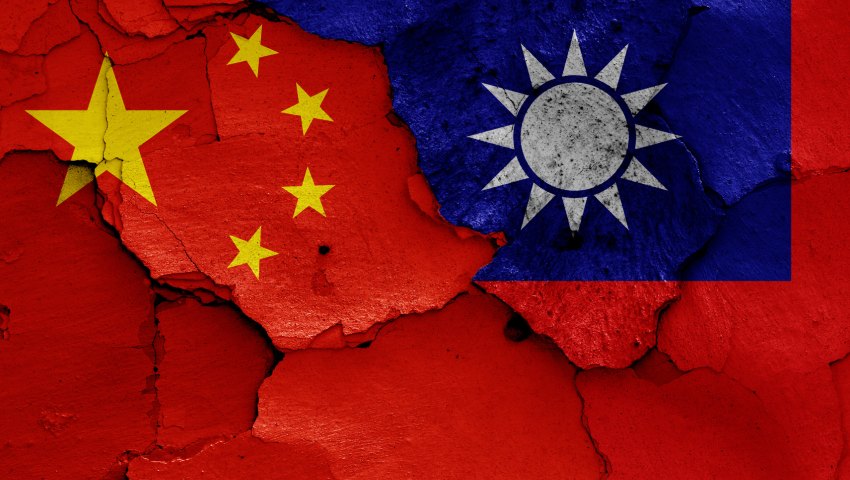In the past two years, Beijing has stepped up military and diplomatic pressure to assert its sovereignty claims over Taiwan, angering Taipei and causing deep concerns in Washington.
To continue reading the rest of this article, please log in.
Create free account to get unlimited news articles and more!
This week, Chinese Foreign Minister Wang Yi said China would not fear confrontation with the US but welcomes co-operation if it is mutually beneficial.
Wang added that the problems in the US-China relationship were down to "strategic misjudgments" by the American side, he said in a speech, posted on the foreign ministry website.

According to Minister Wang, "there is no harm" in competition but it should be "positive", however he also asserted that "in the face of external interference and provocation, China will resolutely defend national sovereignty, security and national dignity".
China claims democratically governed Taiwan as its own territory. This year Beijing deployed a record number of military aircraft, and the Chinese navy has also held live-fire drills close to Taiwanese waters to amp-up the pressure.
THE BREAKAWAY PROVINCE
Leaders in Beijing assert there is only one China and that Taiwan is a rebellious part of it.
Wang reaffirmed that notion after labelling Taiwan a "wanderer" that would eventually come home and warned it was not a "chess piece to be played with", during the virtual summit.
As China grows militarily stronger, it may be tempted to invade Taiwan but a full-blown conflict would be a catastrophe, it need not be inevitable according to experts.
While a direct conflict is unlikely, the future of self-ruled Taiwan is increasingly becoming a powder keg according to experts, and a mishap or miscalculation could lead to confrontation while Chinese and American ambitions are at odds.
Relations between the United States and China are at a low over a range of disagreements including the origins of the COVID-19 pandemic, trade, human rights, and Beijing's increasing pressure on Taiwan.
In a call last month that lasted for more than three hours, US President Joe Biden pressed his counterpart, Xi Jinping, on human rights while President Xi warned that China would respond to what it called provocation on Taiwan.
COMPETITION FOR THE INDO-PACIFIC
Over decades, Australian governments have mirrored US policy by not announcing publicly whether they would come to Taiwan's aid if the island was attacked by China, which regards the island as a breakaway province.
Earlier this year, responses to the AUKUS agreement differed across the Asia Pacific region, from outright support through to worry about the increased militarisation of the Indo-Pacific.
Australia’s Indo-Pacific neighbours responded to the new AUKUS alliance were far from uniform, ranging from outright support from governments through to concern that the new agreement would lead to a new military arms race in the region.
However, Australia’s forward planning as set out in the Strategic Update has set the country on course to be an ambitious military player in the region, contingent on the goodwill and support of regional neighbours to preserve ongoing stability in the Indo-Pacific.
This is the view of Susannah Patton, research fellow in foreign policy at the University of Sydney’s United States Studies Centre, writing in ASPI’s The Strategist this week. Patton argues that Australia cannot set aside concerns held by the country’s regional neighbours, whose traditional perception of the US typically diverges from Australia’s.
“While some countries, notably the Philippines and Singapore, were positive about the AUKUS announcement, statements from Jakarta and Kuala Lumpur reflected concerns that the AUKUS arrangement would contribute to a regional military build-up, raising tensions and making conflict more likely,” Patton argues.
"And a move like AUKUS that signals a strong US commitment to the region should help prevent China from dominating it, something every country is worried about.
"They’ll take comfort from the fact that the Philippines, one of the key claimant states in the South China Sea, is much more supportive, and that Vietnam is likely to be, too."
Patton, however, suggests than many in Australia’s foreign affairs and defence apparatus may overlook these views of our Indo-Pacific neighbours due to strategic naivete, or sideline them by prioritising the opinion of India and Japan – being more strategically influential.
Indeed, she continues that some may even downplay fears of regional pessimism towards the announcement. Patton notes that analysts are likely to suggest that behind the scenes, many of our neighbours may support the action while appearing to be less supportive in public.
While providing significant military capability benefits to Australia, the AUKUS partners must assuage the concerns held by those in the region – even if they are privately supporting the new partnership.
The alliance will come under criticism and scrutiny from China and the European Union, thus Australia must proactively and consistently demonstrate the benefit of the alliance to ongoing order in the Indo-Pacific.
FORCEFUL COUNTERMEASURES
How could a small island risk a superpower clash and what are the risks of heightening tensions?
In the CCP's view the cause of current tensions was the Taiwan government's attempts to "rely on the United States for independence".
According to Wang, the US and other countries were trying to "use Taiwan to control China," who is also a state councillor, in addition to his role as Foreign Minister.
"It is these perverse actions that have changed the status quo and undermined the peace in the Taiwan Strait," Wang said, who was a former head of China's Taiwan Affairs Office.
"[It is] violating the consensus of the international community and the basic norms of international relations."
To respond to this, China had taken "forceful countermeasures" to "shock the arrogance" of those who seek Taiwan's formal independence, Wang continued.
"China must and will be reunified."
Taiwan is arguably the most dangerous place on Earth right now, and a Chinese assault on the small island would be a real test of America's military might and its diplomatic and political resolve.
If the US and its allies are to ensure that war remains too much of a gamble for China, they need to think ahead.
[Related: Asymmetry in the defence of Taiwan – analysing Taipei’s deterrence strategy]

 Login
Login







